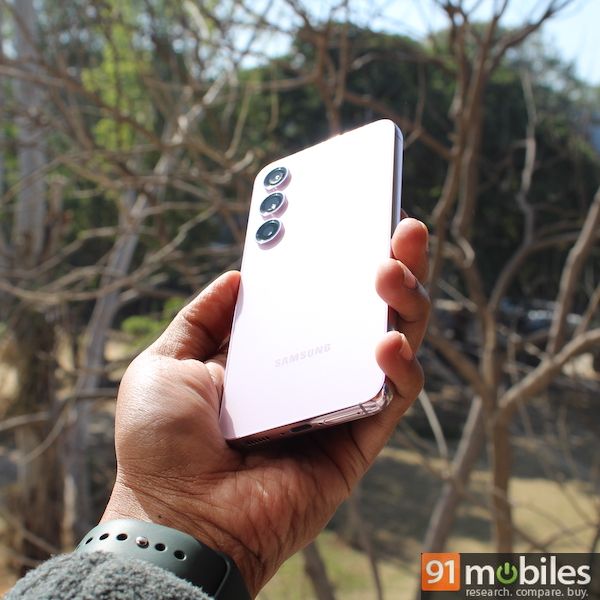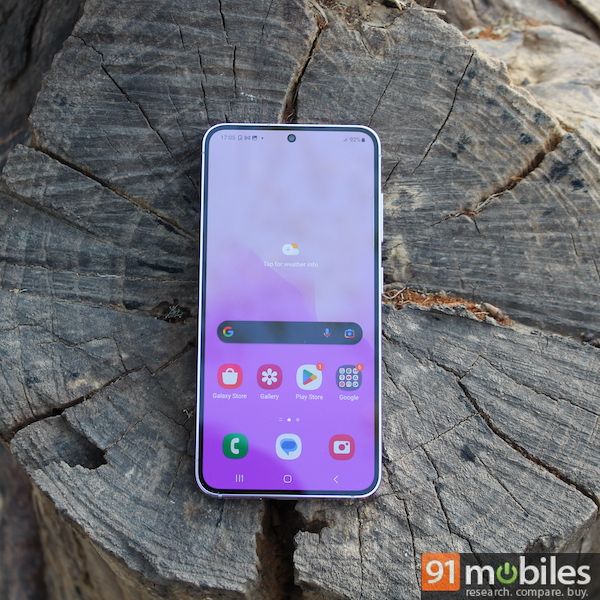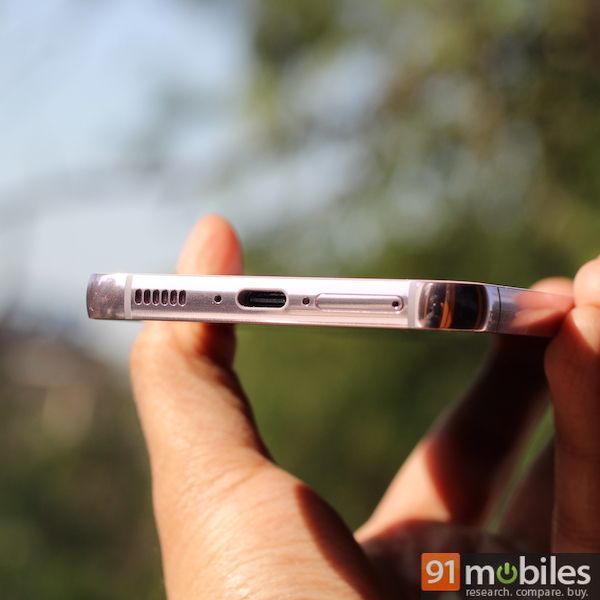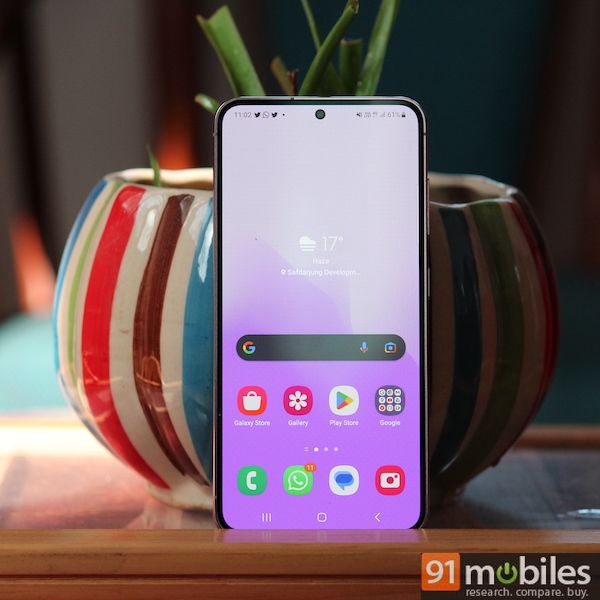As per tradition, Samsung unveiled the Galaxy S23 series at its annual Unpacked event in February. The series comprises three models – the Galaxy S23, the larger Galaxy S23 Plus, and the Galaxy S23 Ultra, which resembles the Galaxy Note series. At first glance, it appears that Samsung has opted for an iterative approach as the three devices share similarities with their predecessors. The company seems to be following the adage, “if it ain’t broke, don’t fix it,” as there are few significant changes from the previous models.
Today, I’ll be reviewing the Galaxy S23. This latest model in the Galaxy S series has a starting price of Rs 74,999, making it the most affordable option in the series. However, if you’re interested in the Galaxy S23 Plus, you’ll need to be prepared to spend an additional Rs 20,000. With its more accessible price point, the Galaxy S23 is expected to be a popular choice among consumers in India.

Design and display
A side-by-side comparison of the Galaxy S23 and the Galaxy S22 reveals only one major change: the rear camera housing on the newer model has disappeared. Instead, you get three standalone camera rings on the rear panel of the Galaxy S23, which gives it a minimalistic look. The Galaxy S23 looks cleaner and more refined for sure, but one might argue that the metal camera bump on the Galaxy S22 added some character to its design.
That said, everything else about the Galaxy S23’s design simply works. Its compact form factor makes it ideal for one-handed use. In a sea of large-screened phones, the Galaxy S23 and the iPhone 14 are perhaps the only choices for anyone looking for a smaller phone.

The matte finish on the rear glass is soft to the touch and ensures you don’t leave any fingerprints or smudges on it. This made the Lavender colour look particularly fresh and attractive throughout the review period. It’s easily my favourite colour option, though the Green one looks good in pictures too.
Structurally, the Galaxy S23 has a solid build quality. The metal frame is thick enough to offer a good grip. Due to the phone’s compact design, the power and volume buttons are easy to reach with your thumb. The device is IP68 rated for dust and water resistance.

The flat 6.1-inch display on the Galaxy S23 is small but not iPhone SE-level small. It is smaller than what you get on most Android phones today and about the same size as the one on the iPhone 14. Screen size aside, every other aspect of the display is nearly identical to what you’ll find on the Galaxy S23 Plus. It is an OLED panel with a 2340×1080 FHD+ resolution, HDR support, and up to 120Hz adaptive refresh rate. Samsung is in its comfort zone when it comes to OLED displays, so be rest assured that the Galaxy S23 will deliver vibrant colours and deep blacks here.
Peak brightness has been bumped up to 1750 nits from 1300 nits. Even at less than max brightness, you will be able to see the screen clearly outdoors under direct sunlight.
Cameras
The cameras on the Galaxy S23 are largely unchanged from those of its predecessor. It features a 50MP main camera, a 12MP ultra-wide and a 10MP telephoto lens on the back, while the front has a 12MP lens. In good lighting, the Galaxy S23 delivers visually striking photos with saturated colours and a wide dynamic range through the primary sensor. The pictures tend to have a warm hue, which makes outdoor and indoor shots taken in sunlight appear eye-catching. However, the camera has a noticeable shutter lag that can compromise quick snapshots or result in blurred images of moving subjects, which is a drawback.
Switching to the 12MP ultra-wide sensor instantly downgrades detail and brightness, so it is best used in daylight. The Portrait Mode uses a 10MP telephoto lens to capture pleasing portrait shots in good lighting conditions, with fine edge detection and detailing. Portrait shots get grainier and a softening of facial features is noticeable in less-than-ideal lighting. The telephoto lens also captures 3x optical zoom with good detail retention.


Night photography on the Galaxy S23 is impressive as long as you use the dedicated Night Mode that’s tucked away in the ‘More’ option. In a setting where you have tons of glowing signages, the Night Mode expertly handles highlights and retains details. That said, I was not a fan of the excessive glare coming from light sources like streetlights or headlights at night. Night Mode does come on automatically, but only in really low-light conditions and not if you’re in a well-lit environment with enough artificial lighting.


The 12MP selfie camera is able to capture good detail and colours in well-lit environments, though some smoothing of facial features is noticeable. Meanwhile, the 50MP primary camera excels at video recording, ensuring stable and smooth footage thanks to good optical image stabilisation (OIS) support.

Even though the cameras on the Galaxy S23 are similar to the ones on the Galaxy S22, the images captured are noticeably better. In fact, I could go as far as to say that the Galaxy S23 captures some of the best photographs on a flagship phone this year. I feel the extra “oomph factor” comes from the Snapdragon 8 Gen 2’s Cognitive ISP that uses real-time AI processing to analyse and optimise images.
Performance and software
With the Galaxy S23, you get top-of-the-line hardware thanks to the blazing-fast Qualcomm Snapdragon 8 Gen 2 and 8GB of RAM. This combination is enough to effortlessly run through most of the apps available on the Play Store. Internal storage is capped at 256GB on the vanilla S23, while you can get up to 512GB on the S23 Plus and 1TB on the S23 Ultra (review). Throughout my use of the device, I didn’t encounter any stuttering or lag. The Galaxy S23 delivers an incredibly smooth experience, with fast app loading times and seamless multitasking. Even during intensive usage, such as playing graphically demanding games, the device maintained optimal performance and never overheated.

You are greeted with Android 13-based OneUI 5.1 out of the box. Samsung’s UI is instantly familiar to anyone who has used a Samsung phone before. It is a rather easy UI to navigate through and you get a few pre-loaded apps from Samsung, Microsoft and Google to help you get started.
Battery life
The Galaxy S23 gets a 3,900mAh battery, a 200mAh increase from its predecessor. While this may sound like a minor upgrade, it has improved the S23’s battery life substantially. Despite this improvement, the Galaxy S23 still has a one-day battery life (which can fluctuate if you’re on an active 5G network throughout the day) and can’t last two days straight. However, it can endure extended periods of heavy usage compared to the S22 and still maintain its battery life. I managed to get over 5 hours of active usage before having to reach for the charger.

The sad thing about the Galaxy S23 is that its fast charging support is limited to 25W fast charging. The Plus and Ultra models, however, offer faster charging speeds, up to 45W. You also don’t get a charger in the box, so you will have to buy Samsung’s 25W adapter separately. With the 25W adapter, it takes roughly 70 minutes to fully charge the Galaxy S23 from 0 to 100 per cent. And if you have a 20W charger lying around, the charging time increases to around 1 hour and 30 minutes. This is clearly not the best charging time when compared to other, more affordable, Android phones that currently offer lightning-fast charging speeds.
Final verdict
I can safely say that the Samsung Galaxy S23 is the best small Android phone in the market right now. Its compact form factor and easy one-handed useability is its biggest selling point. Although the design may not be significantly different from its predecessor, the premium build quality, powerful performance thanks to the Snapdragon 8 Gen 2 processor, and excellent camera capabilities make it a worthwhile investment for those seeking top-notch hardware on an Android device without breaking the bank.

Editor’s rating: 4 / 5
Pros:
- Clean and compact design
- Stellar performance
- Excellent cameras
- Improved battery life
Cons:
- Persistent shutter lag
- Slow 25W charging speed
The post Samsung Galaxy S23 review: small pleasures first appeared on 91mobiles.com.





0 Comments